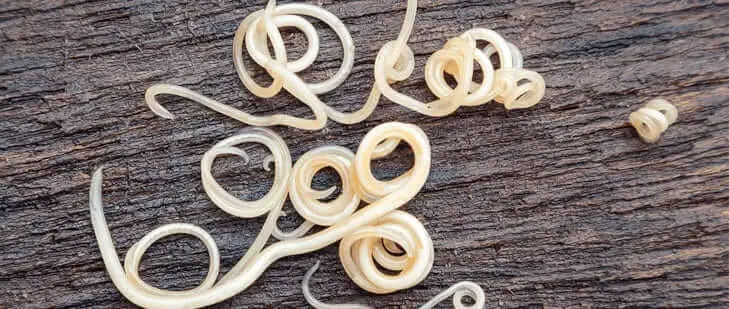Animals that lick sniff, and gobble anything in its path, not to mention dirt, trash, and poop, are liable to pick up pests and get infected with different kinds of parasites.
Dogs are the ideal hosts for worms and parasites; all the things they do with their mouths, kiss, groom, and other habits may pass unwanted guests to their organs.
And I know this myself, as my dog has already suffered from lots of worms. I am going to give you everything you need to know about worms in this article.
Does my dog have worms? Common symptoms that can tell you there are some worms in your dog:
| Symptom | Description |
|---|---|
| Coughing | It is one of the advanced symptoms of heart-worms. Also, dogs with roundworms and hookworms may develop the same signs. |
| Vomiting | Is a common symptom for dogs who have worms, and roundworms may sometimes show up in the dog’s vomit. |
| Diarrhea | Canine diarrhea and soft stools are typical results of worms infestation. Additionally, sometimes stool is mixed with blood. |
| Low energy | It’s a logical result for a dog having worms. The dog would be less active than usual. |
| Potbellied appearance | his is commonly seen in puppies that have picked up the worms from their mother. Your dog would appear potbellied or bloated. |
| Change in appetite | If your dog has come in contact with roundworms. He might show a sudden change in appetite because the worms steal the dog’s nutrients, making him increasingly hungry. |
| Weight loss | Dogs that have tapeworm or whip-worm would show a rapid weight loss. |
| Dull coat | One of the signs of a healthy dog is a thick, shiny coat. Accordingly, if your dog’s coat begins to show a dull appearance and dry out, he may have picked up worms. Also, some hair loss might be noticed or the presence of rashes. |
| Skin irritation and itching | Dogs with a severe infestation of worms may show signs of skin irritation. |
| “Scooting” or rubbing its bottom on the ground | Sometimes, this can be caused due to problems with the anal glands. However, dogs with worms will rub their rear on the floor more often. This relieves them of the itches caused by the worms in this area. |
| Visible worms in fecal matter or fur | Some kinds of worms, like the tapeworm, may appear in the hair or the area around the dog’s anus as small moving segments. Roundworms may also appear in the dog’s stool. |
Worms have five types, and to identify each one of them it’s best to go to your vet where he can run the examine himself. While each worm has its own treatment scenario, it’s best to prevent worms in the beginning as they can be very harmful to your dog in the long run.
symptoms of worms:

As a pet owner, how do I know that my dog has picked up worms?
The idea of your dog having some creepy crawlies is always unpleasant. It’s your duty as a pet owner to be aware of the general warning signs that show your dog having worms infestation.
What Are The Kinds Of Worms?

One of the most common health problems for dogs is worms. We have five types that usually affect dogs:
- Heartworms
- Roundworms
- Hookworms
- Tapeworms
- Whipworms
Some of them can be easily spotted than others. For example, if your dog picks up a tapeworm, you can see things like rice grains in its stool. However, the heartworms are not easily spotted.
Heart-worms:
It is the most worrisome type of worms in dogs, and the most preventable. Mosquitoes can transmit this worm.
Heart-worms grow and multiply within the heart, lungs, and blood vessels of your dog. They can cause heart failure, severe lung disease, other organ damage, and eventually death if left untreated.
It can also be accompanied by some respiratory symptoms, like coughing, weak pulse, labored breathing, exercise intolerance, weight loss, and pale gums, and in extreme cases, abdominal distension.
A blood test usually detects the heart-worms. Typically, dogs that begin treatment in the early stages have a higher chance of getting well.
Since avoiding mosquitoes ( the insect which transmits the parasite) is inevitable, an annual test for heart-worms is always a good idea.
However, prevention is the best approach in dealing with heart-worms, as the treatment is quite expensive, lengthy, and may have serious side effects.
The treatment usually requires confinement and exercise restrictions, which is hard for both the dog and the owner as well. Accordingly, regular testing is highly recommended. And checking the treatment with the vet is vital. Unfortunately, every dog differs from the other.
Roundworms:
They are parasites that live inside and feed off the animal intestine. They are usually white or light brown in color, and a few inches long, they even look like spaghetti. You can notice them in the dog’s poop or vomit.
Puppies usually have the highest risk of getting them either from their mother; if she’s infected with roundworms, she may pass them before birth or when drinking her milk.
Alternatively, from the environment, if the puppy eats roundworms eggs that come from another animal’s poop. The puppy can be infected with roundworms if he eats other small-infected animals or sniffs another infected dog’s poop.
The roundworm life cycle is as follows: the dog swallows the eggs, they hatch and turn into larvae. These larvae would spread through the dog’s liver and up to his windpipe.
He would then start to cough and swallow the larvae to reach his intestine, where they grow into adult worms. They then begin laying their own eggs to continue their life cycle.
Surprisingly enough, some dogs don’t show symptoms of being infected with the roundworm, but others may show weakness, diarrhea, vomiting, pot-belly, belly pain, weight loss, dull coat.
Roundworms may be noticed in the dog’s poop or vomit. Once these symptoms are noticed, it is recommended that you take your dog to the vet to start the necessary treatment.
However, it is easy to prevent your dog from being infected with roundworms by:
- De-worming your puppy when he’s young, the best age is three weeks old.
- Keep the dog’s things and area clean. You can clean up the yard after playing. Additionally, don’t let your dog use the playground or the sandbox as a litter box.
- Keep your dog away from the small wild animals, which may be carrying roundworms—keeping him on a leash or in a fenced yard is advisable.
- Give your dog medications to prevent and control roundworms.
- Discuss de-worming with your dog’s vet to avoid infection.
Tapeworms:
This is an intestinal parasite that infects the dog when he eats infected fleas. Once these fleas are ingested, the tapeworm egg hatches and attaches to the dogs’ intestinal lining.
The dog can pass segments of the tapeworm in its stool, which can be visible as little pieces of rice. Sometimes the infected dog would scoot its bottom along the ground to relieve the feeling of itch.
Once you notice these symptoms, you may take a stool sample to your vet for diagnosis and receive the necessary treatment. The drug is given to the dog either orally or by injection. Additional therapy for ridding any fleas from your dog is considered a necessity.
Hookworms:
This is also an intestinal parasite that causes anemia and can be fatal to puppies if left untreated. There are several kinds of hookworms, but in general, they are ( around 1/8 of an inch). They ingest a large amount of the dog’s blood when they are attached to the intestinal wall.
Dogs get infected by hookworms from ingesting larvae from the environment or from the mother’s milk to her puppies.
Also, dogs can pass hundreds of the hookworm eggs in their stool, they hatch and can remain alive in the soil for several months waiting for another host to ingest the infected dirt or lick them from the bottom of its paws, or even sniff the infected feces.
Hookworms are diagnosed through microscopic examination of the stool sample. The sample is mixed with a solution that causes the hookworm eggs to float where they can be detected microscopically.
Deworming medication is usually given to the dog twice to catch the adult worms, then two-four weeks later, to pick the new ones.
Whip-worms:
This type lives in the cecum (the beginning of the large intestine) and colon. They pass their eggs through the dog’s feces.
Dogs are infected from ingesting infected substances such as soil, food, water, feces, or even animal flesh. The whip-worm eggs can stay alive up to five years in a warm and moist environment that is why immediate cleaning up after your dog is very important.
Whip-worms don’t show symptoms in mild cases; however, they may lead to inflammation, diarrhea, weight loss, and anemia in severe cases.
Your vet would diagnose the whip-worm by examining a sample of the dog’s feces. Still, the worm eggs are not easily detected on all fecal samples.
Accordingly, a repeated, fecal examination is recommended.
Your vet will prescribe a suitable treatment plan, which often requires three months.
Is There Any Risk For Humans To Get Infected?
Well, it’s rare, but roundworms may infect humans if they are in contact with the infected dog’s stool or contaminated soil.
Of course, kids are at a higher risk of getting infected with these worms. So, you have to keep them away from the areas where the dog has used the bathroom and wash their hand regularly, especially after being in contact with the dog.
Last but not least, if you are worried about being infected with worms from your dog, avoid letting them lick or kiss you or your kids. And most of all, make them sleep in their own bed, not in your bed.
What Should You Do If You Suspect Worms In Your Dog?
Most types of worms can damage the dog’s intestinal organs, which might lead to loss of consciousness and death.
They can usually be detected through a microscopic examination of a stool sample. If you suspect that your dog is having any of the symptoms listed above, take it to your vet with a stool sample for examination.
Most dog-worm types are easily treated, and your vet would prescribe the necessary medication based on the diagnosis. Except for the heartworm disease, treatment is quite expensive and challenging for the dog.
Therefore, a regular examination will prevent worm infections, and treatment will reduce the health risks to your dog as well as the worms spreading.
De-Worming Dogs And Puppies
There are some safe ways you can de-worm your dog because the sooner you get rid of them, the faster your dog will get healthy.
Your vet will prescribe medicine for your dog, usually oral or in a shot to kill the worms. Most of these medications are broad-spectrum as they treat a wide range of parasites.
But, because puppies are commonly infected with worms, your vet will recommend de-worming them for the first time at 2-3 weeks old. This will take more than one dose.
The first dose would kill the worms that might be already there, while the second would kill the hatched eggs a few weeks later. Treatment is the same for adult dogs but with a higher dosage.
However, heart-worms are a different story. Your vet will do some blood tests, X-rays, or maybe other tests to diagnose the infection’s seriousness.
The dog will start on a monthly heart-worm prevention antibiotic and anti-inflammatory. A month later, the actual treatment starts, which is a strong medicine that should be given by the vet.
The dog will get a series of three shots over 2-months.
Unfortunately, this is not the end. The dog needs to be kept calm and quiet for several months after the shots.
The dead heartworms break into pieces that can block the blood from flowing to the heart or lungs. If that happens while the dog is exercising, the dog could die.
Of course, your vet will give you all the necessary tips to make sure the sick dog would recover safely.
Another blood test is done after six months to check for worms. If they’re still there, the dog will need another round of shots. If they’re all gone, you will continue the preventative medicine for the rest of the dog’s life and regular test every year.
How To Prevent My Dog From Being Infected With Worms
The best way to prevent your pet’s infection is to control the pests that carry the parasites, such as fleas and mosquitoes, and keeping your home and yard clean.
Here are some simple steps that might help:
- Make sure to have a regular check-up for your dog, including all kinds of worms, at least once a year.
- Keep your dog, flea-free. You can buy the flea collars or medicine put on your dog’s skin.
- Use the prescription you get from your vet to prevent heart-worms to be given to your dog once a month. You can also ask you vet for an injection every six months; it’s called Pro-heart.
- Make sure to practice the four PS: Pick up ( and throw away) the pet’s poop at once. Clean up your yard weekly and scoop up after your dog when you go for a walk.
- Wash your hand more often, primarily after you pet your dog or after picking up its waste.
- Long story short, prevention is the best treatment. The regular testing, flea control, and hygiene is the best way to prevent serious health problems caused by worms.
In Conclusion
Understanding the risks, symptoms, and treatment options for dog worms is a crucial responsibility of the dog’s owner.
Serious health problems might happen if the worms are left untreated. They can infect other dogs and, in some cases, the people that come in contact with the infected dog.
Preventative treatments, flea control, and cleaning up the dog’s waste can help minimize the risk of infection with dog worms.
Write down your story about dog worms in the comments section and check our previous posts:

